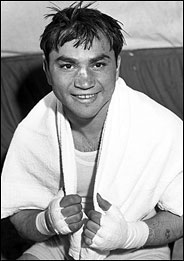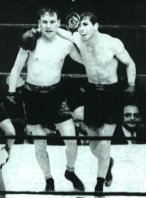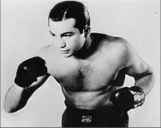- Home |
- About |
- Contact Us |
- RSS
Barney Ross - Jewish Boxer and War Hero
One of the all-time greatest Jewish boxers and World War II hero
Died: January 17, 1967 - Chicago, Illinois

At 13, Ross's father was murdered, shot dead resisting a robbery in his store and his whole word turned upside down. Soon after, his mother suffered a nervous breakdown and most of his siblings were either sent to live in orphanages or with extended members of the family. With Ross left almost totally on his own he began to hang around the streets and quickly became a brawler, thief and money-runner. One of his street pals was the young Jack Ruby, who would later gain infamy as Oswald's executioner. For a period he even worked for Al Capone. Already, his life was intersecting with legendary, if not unsavory, characters.
In an effort to make enough money to reunite his family he became a boxer, realizing that, "he can make decent money as a "pawnshop fighter," an amateur boxer pawning off the watches and shoes he'd win in bouts." His mother returned soon after, but because she so disapproved of boxing, he fought under the name "Barney Ross," to conceal his new career.
Ross went on to win the Chicago and Intercity Golden Gloves in 1929 and fought nearly 200 amateur fights with an impressive record. He became well known for his speed, cleverness and stamina, although never a knockout artist. He turned pro in 1929 and fought a series of bouts leading up to March 26, 1933, when he faced world Lightweight and Jr. Welterweight champion and fellow three divisions world champions club member Tony Canzoneri in Chicago. He won by decision in ten rounds. This was a shocking victory, as he was a major underdog.
Alternating between welterweight and lightweight classes, he fought a series of fights over the next several years gaining and defending various world titles, which included three wars against his greatest nemesis Jimmy Mclarnin. Ross "showed unflinching courage by counter punching when hit hard and always staying on his feet, a formula that served him throughout his life." 2 Always a crowd favorite, Ross, with the moniker "Pride of the Ghetto" was fighting in front of crowds as great as 70,000 fans.

In his private life, Ross was no saint. He was a chronic gambler, blowing huge fight purses ($30,000 or more) at the track, and perpetually owed money to bookies, loan sharks and mobsters. Just as with many other boxers of that or any era, "he drank, caroused, picked up tabs and lavished gifts upon his hangers-on with the fervency of a college student stumbling onto an open bar reception." 3
His last fight was on May 31, 1938, versus Henry Armstrong, where he lost by decision after 15 rounds. Although he was punished at will by Armstrong from the 4th round on, he refused to quit even with the referee begging his managers to throw in the towel. Ross had always gone the distance and desperately wanted to end his career in the same manner. Despite the brutal punishment he took, the referee, understanding the significance of letting it continue, allowed it to do so.
He retired with the record 72 wins, 4 losses, 3 draws and 2 no-contests, with 22 wins by way of knockout.
After the Japanese attacked Pearl Harbor in 1941, Ross enlisted in the U.S. Marines, despite, at 32 (some sources cite his age at 34), being beyond draft age. Although he was assigned to work as a boxing instructor, he requested that he be sent into combat. He was sent to Guadalcanal Island, on which on one of the most brutal, U.S. military engagements ever took place against the Japanese.
One night he and three comrades were out on patrol and were attacked by Japanese troops. His three fellow soldiers were wounded and Ross shepherded them into a crater hole where he protected them throughout the night. During this long, bloody night, he fired off over 200 rounds at the enemy and when the bullets ran out he hurled 22 grenades at enemy machine gun positions. He was credited with killing roughly 20 of the enemy, in this overnight period. By the morning, two of his colleagues had died and he was able to carry the sole survivor to safety. For these exploits he received the Silver Star, Purple Heart, and a Presidential Citation.
While in the military hospital recovering from the wounds he had received during that night as well as a bad case of malaria, he was treated with morphine to which he quickly became addicted. At the height of his addiction the habit was costing him up to $500 per day. Eventually he beat the addiction and became an anti-drug spokesman, lecturing throughout U.S. high schools on the dangers and evils of drugs.
He worked tirelessly, lobbying for the emerging State of Israel, seeking donations from his underworld connections to buy and smuggle weapons into Israel. He also tried to create a corp. of American Jewish war veterans to send to Palestine to fight but this was blocked by the State Department.
Ross died of cancer in his adopted hometown of Chicago when he was 57 years old. He is a member of the International Boxing Hall Of Fame.
- He was only knocked down in one of 81 fights against Jimmy McLarnin, in 1934.
- He had a small role in the movie Requiem for a Heavyweight
- Wrote an autobiography called No Man Stands Alone
- Testified at Jack Ruby's trial for the murder of Lee Harvey Oswald.
- In 1957, Ross's life and battle with addiction were depicted in the film Monkey on My Back, directed by Andr� De Toth and starring Cameron Mitchell as Ross.
Some of these sites were used as source material for this entry and may be of interest to those looking to learn more about this person/topic.
- Random House - 'Barney Ross' by Douglas Century 1
- The Jewish Ledger - The Barney Ross story is rescued from oblivion
- Eastside Boxing - Barney Ross: A Friend for Life
- Answers.com - Barney Ross: Information from Answers.com
- Jewish Virtual Library - Barney Ross
- American Jewish Historical Society - Barney Ross's Greatest Battles 2
- Cyber Boxing Zone - Barney Ross
- The Jewish news weekly of Northern California - Boxer Barney Ross� Bio is Thrilling but Flawed � Like its Subject 3
SEE ALSO
 Copy the text below to cite your paper or article:
Copy the text below to cite your paper or article: 

